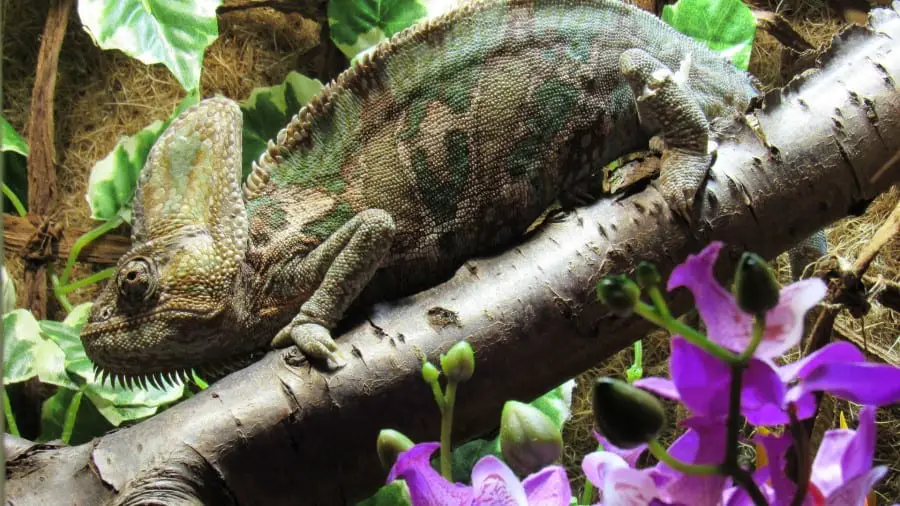
Before buying chameleons as pets, most people wonder if they are stinky. Having a stinky pet around isn’t going to be pleasant. Just like you, I was wondering the same question right before I bought my pet chameleon. Are chameleons stinky?
Chameleons are not stinky under any normal circumstances. However, there are times that you might find them producing a foul smell.
Most of the time. you don’t have to worry about your chameleon’s smell. Despite that, if chameleons can smell if they are not taken care of well.
Is Chameleon’s Natural Body Odor Stinky?
Chameleons generally do not have an odor. As you may or may not know by now, reptiles do not sweat like us humans.
Hence, not giving them a reason to be stinky. I’m sure if you have a pet chameleon or have been around one at certain times, you might be puzzled by what I am saying.
I can sense that thought running in your mind, “what is this guy talking about? My chameleon stinks like rotten meat”, well let’s slowly indulge in that.
Remember, as I mentioned, there’s a reason for that, and it’s definitely not your chameleon’s body odor
Chameleons Smelling Like Rotten Meat
If you have ever experienced your chameleon smelling like rotten meat, it’s very normal. The main source of the smell of rotten meat comes from the waxy material produced by the chameleon.
Chameleons produce this waxy material using a secret pouch at the side of their mouths. Let me delve a little deeper into what exactly happens in their “secret pouch” that produces this foul smell.
Chameleons’ Secret Pouch
Chameleons have a secret pouch in their mouth which they use to collect the remains of dried shed skin and bits of food. It may look like your chameleon is eating shed skin, but they are not in this case. Over time, those objects in the pouch will start to rot.
If you carefully observe your chameleon while it eats, you will see small pieces of food being moved to the pouch for storage. All these shed skin and food are stored in the pouch.
They are collected and aged to produce a putrid substance, which is waxy. The function of this substance is to act as a trap to lure its prey.
Chameleons in the wild usually spend most of their time on trees and branches. Although they possess an amazing tongue which in some instances could shoot out to about two body lengths worth of distance, this method of luring the prey to them makes it easier and simpler for them.
It can save chameleons a lot of energy by not needing to shoot their tongues out so far. Instead, they just create a trap and lure the prey. This gives the chameleon a much higher chance of success when hunting for food.
Insects get super attracted to this waxy bait. Scientists have suggested that the contents in a chameleon’s mouth pouch are very similar to the ones in insect pheromones. Insects these pheromones to attract fellow insects for mating purposes.
How Do Chameleons Cause This Foul Odor?
After chameleons produce this waxy material, they wipe their jaws against tree branches or against the steel bar of a cage, when in captivity.
This exudes a waxy material, which only has one purpose, to attract prey. Unfortunately, that waxy material also produces a very pungent scent.
What Other Smell Should I Worry About?
Just like all of us and any other animal, chameleons also do poop and pee. Although their poo may not be smelly or stinky, their pee could at times smell like human urea.
Again, poop in a normal circumstance doesn’t cause much of a hassle especially in terms of smell. Nevertheless, when the chameleon has a parasite infection, the usually solid poop is going to start coming out mushy and soupy.
This can cause them to stink real bad. Chameleon’s poop and pee (white part of the poop) both come out together in a solid-state, without much of a smell.
However, if they happen to come out in liquid form and smelly, then I suggest taking your chameleon to a vet. Your chameleon may be experiencing a parasite infection.
Another way the poop and pee of the chameleon could smell is if you leave the waste out too long. Chameleons need to be misted frequently. Due to this, the moisture in the air may mix with the excretes and liquefy it.
Preventing Your Chameleon From Smelling Bad
It is very simple to prevent having this smell for your pet chameleon. One of the easiest ways to prevent this awful smell is to start cleaning your chameleon’s cage every week.
Wiping down everything in the cage and also the cage bars. On top of that, remove their poop every time you see them laying around.
Yes, it is tiring and takes up some time but at least I could chill in the same room as my chameleon and not stress about the pungent smell.
Both the waxy material and the poop your chameleon produced isn’t so hard to remove. If you are worried about removing the waxy material your chameleon produced as bait, don’t be.
This will not affect your chameleon in any way since food is provided to them in captivity, there’s no need to hunt.
Hence, removing their bait for insects in a domesticated environment is alright for the chameleons.
Conclusion
Chameleon by itself doesn’t stink. The smell that you experience if you spend enough time in a room with this mesmerizing reptile is basically its natural ways of baiting its prey.
You should never expect a reptile to stop being its natural self, simply for your own comfort. These reptiles are not going to change their ways just because we have removed them from their natural habitats and kept them domesticated.
All we can and should do is put in some extra effort and clean up after our little reptile friends. This way, you and your chameleon could both live harmoniously together.
Other than the bait smell, the only other reason your chameleon would stink is either you have not cleaned up after it, basically our laziness, or it’s not well. In which case, take it to a vet as soon as possible.


